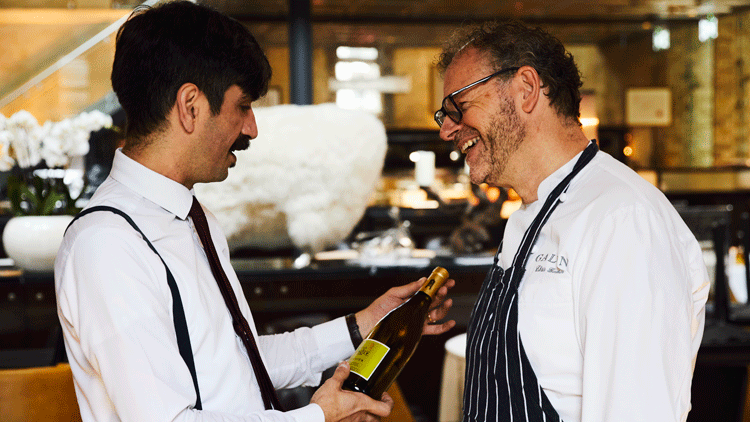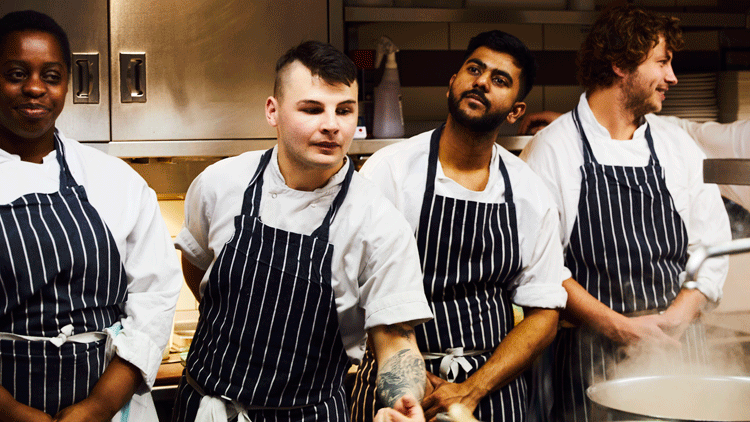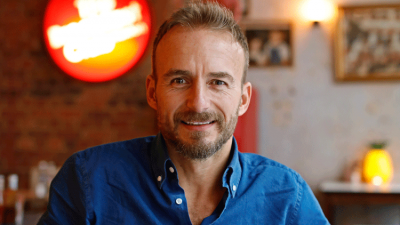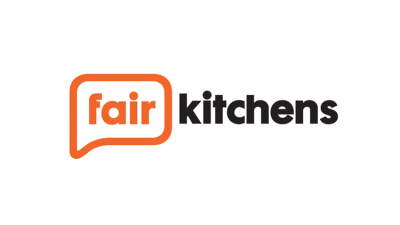Promotion
Kitchen culture needs to change: here’s how
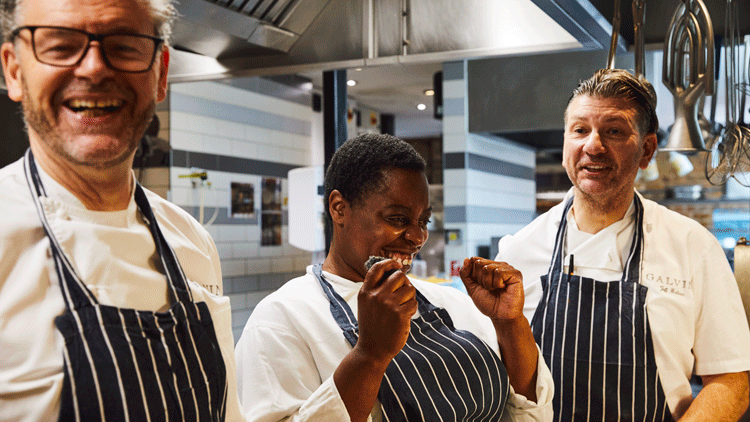
As one of the most respected names in the UK restaurant business with an empire that includes the Michelin-starred Galvin at Windows and Galvin Chapelle, Chris Galvin is no stranger to hard work.
But at this point in his career - he recently turned 60 - he probably didn’t expect to be working double shifts in his kitchens six to seven days a week (and neither did his younger brother Jeff, with whom he runs the Galvin Restaurants business).
Faced with an unprecedented staffing crisis triggered by Brexit and the pandemic, the pair have had to roll up their sleeves and go back into the kitchen full-time, in some cases running sections rather than overseeing proceedings from the relative comfort of the pass.
Though compounded by these two major events, the squeeze on skills has been percolating for decades. There are many different factors at play - not least the enormous growth of the restaurant and wider hospitality sector over the last 20 years - but one big and rather uncomfortable reason is that the professional kitchen is often not an especially nice place to work.
The hours are long, the work is hard, the pay isn’t brilliant, and people aren’t necessarily treated fairly by their co-workers and employers. “The pandemic and Brexit have accelerated a change that was already coming down the track,” says Galvin.
“The industry has not been looking after its people properly for decades. Leadership is often poor. In some cases people have not been paid correctly. People have not been developed properly. The level of staff turnover has been completely unacceptable. We must acknowledge that this has happened on our watch and make kitchens better, fairer places to work.”
Galvin is an ambassador for #FairKitchens, a global movement driving change to secure a healthier and more sustainable foodservice industry. He is one of several industry experts to have contributed to a new and completely free leadership training programme.
Entitled ‘Leading a Fair Kitchen’, the online programme aims to improve working environments and address staff retention issues by empowering leaders with insight and practical tips from others in the industry. The training is presented by Unilever Food Solutions, one of the co-founders of #FairKitchens, in collaboration with highly respected training organisation The Culinary Institute of America (CIA).
#FairKitchens caught up with Galvin and fellow #FairKitchens ambassadors Charlotte Hutchings, group people director at hospitality and catering business CH&CO, and American Culinary Federation president Kimberly Brock Brown. Here’s what they had to say about the skills shortage, the poor image of the cooking profession and what can be done about it.
How badly is the staffing crisis affecting your business at the moment?
Charlotte Hutchings: Our vacancy list has doubled over the last month. People left the industry during the pandemic and have not returned, partly because they’re worried there could be another lockdown but also because they have found alternative jobs in other industries where the salaries, benefits and so on may be more attractive.
Chris Galvin: It’s hellish. But we are seeing a bit of a trickle back now. A lot of the European staff that went home because of the pandemic are looking to come back now.
CH: As a hospitality and catering company we face many of the same challenges as the wider hospitality sector. But one big difference is that we always have a client to consider, which can make things more complex. But on the plus side parts of the contract catering world are marvellous for work life balance. People typically don’t have to work anti-social hours, take education for example.
The team at Galvin Restaurants photographed by India Whiley-Morton
What’s the strategy at your business? How are you making these jobs more attractive?
CH: We’re working hard to enhance our benefits proposition. Current benefits include maternity and paternity leave, sick pay, wellbeing package, high street discounts and more.
CG: One thing we’ve got to do is applaud the army of people that are turning up to work every day. It’s easy to forget the loyal, dedicated team members when you’re looking for new staff.
What about training and development?
CG: Generally speaking, it’s something the industry is not great at. We need to think more carefully about how we develop people. We need to help people progress their careers, or we’re going to lose them.
Kimberly Brock Brown: I’m dedicated to mentoring and teaching younger culinarians. Someone had to show me the ropes so it’s important I do the same. You can’t take your recipes and skills with you when you go. It’s important to pass things on.
Has the image of kitchens taken a big knock in the US too?
KBB: We’re a bit ahead of the UK in that there was a reckoning three or four years ago when some high-profile chefs were called out for their behaviour and how they treated their staff. It’s still in the spotlight but things have calmed down a bit.
What can the industry do to address its image problem?
CG: There’s a lot of negative news about hospitality right now. That’s a shame because the hospitality industry can be a brilliant place to work. We’re light years ahead of where we were when I was starting out. Bullying, sexism and racism were rife in kitchens. It was disgusting. But that has largely been eradicated, and it certainly does not happen in my kitchens. That said, we still need to do much better, especially when it comes to working conditions, hours and pay.
CH: The media is key, we need to move our role models away from shouty, aggressive chefs. We need people that are progressive and gentler in their approach and more understanding of others. Movement like #FairKitchens will be able to help with that.
Pay is another big issue. Historically chefs have not been paid properly for working long hours...
CG: That’s been the case for nearly my whole life. We must pay people for all the hours they work and also seek to reduce working hours to improve work life balance.
But who is going to pay for it?
CG: That’s the problem. Suddenly restaurants are getting more expensive. But, in a way, restaurants should be expensive. It costs a lot of money to serve great food cooked from scratch and then take the plates away and wash them up. Eating in restaurants is a privilege that’s been taken for granted for some time. That said, if restaurants are putting prices up, they must ensure they deliver.
What can be done to improve diversity in kitchens?
KBB: We have big problems with diversity in the US. Many kitchens are run exclusively by white men. You don’t see many women, and when you do they’ll either be working the salad station or pastry. When I started there were chefs that would not let me cook the meat because I was a woman. It’s hard to believe that in 2021 that still happens – but it does.
CG: Diversity is incredibly important at our group. We’re as embracing as we possibly can be. For example, we work with The Clink charity to give ex-offenders a second chance. Ethically it’s the right thing to do, but we also can’t afford to ignore these people. We need them. Our Galvin Chance initiative has also helped over 150 kids that have had a difficult start in life find work in the industry.
CH: I worked on the Recruitment & Onboarding module in the #FairKitchens leadership training. A lot of restaurants struggle to recruit a diverse workforce. My top advice would be to set out a detailed job description and to know exactly what you want before you start recruiting; have more than one person do the hiring; and to think carefully about the wording of the job advert and where it appears.
KBB: Diversity results in better, more well-rounded people and by extension teams. Diverse teams are more productive, too.
The team at Galvin Restaurants photographed by India Whiley-Morton
How to you ensure people are treated fairly in the kitchens that you run?
KBB: It’s basic but handbooks are important as they let everyone know where they stand and what is expected of them in terms of how they treat others.
CH: We have an inclusive culture. If people feel they can’t talk to their manager there are other people they can speak to within the business. We also have a confidential hotline that is run by Hospitality Action.
CG: As far as HR is concerned there are several things that are non-negotiable. For example, we don’t tolerate sexist banter.
KBB: As the leader of a kitchen it’s essential that I ensure that everyone is treated in a professional and fair way. I’ve seen bad management throughout my career. Throwing pans and hissy fits are not my style. If I’m disorganised and howling and screaming then the rest of my crew is going to be like that too.
CH: Policies and procedures are very important. Managers are trained on things like our diversity and inclusion policy and our bullying and harassment policy as they start. Then it’s a case of having a strong HR team to support managers in dealing with anything that does get raised.
CG: Increasingly, we’re finding people that come and work for us are already well conditioned. But when bad behaviour does happen our biggest tool is influence - my team would tell that person ‘that’s not how we do it here’.
CH: The culture is changing. The industry is far more inclusive than it was. But there is still work to do when it comes to valuing all that work in hospitality.
About #FairKitchens
The #FairKitchens movement was founded in 2018 amid growing awareness of wellbeing issues at the heart of foodservice and hospitality. Believing that this industry will thrive only when the people who work in it thrive, Unilever Food Solutions joined a group of chefs and partners including Naama Tamir, Michael Gulotta, Kat Kinsman, and John Vitale to initiate the #FairKitchens movement as founding partners.
Three years on, the movement has expanded globally and attracted the support of chefs, operators, hospitality businesses and experts from all over the world. It opens a conversation around unhealthy working conditions, recognising the underlying issues and focusing on bringing solutions. These solutions take the form of sharing success and challenges from operators around the world who lead Fair Kitchens, plus resources, training and tools from partners.
The movement’s most recent project is ‘Leading a Fair Kitchen’, a free leadership training programme that aims to improve working environments and address staff retention issues by empowering leaders with insight and practical tips from others in the industry. The training is presented by Unilever Food Solutions in collaboration with The Culinary Institute of America (CIA).
More than 30 chefs and experts across the world worked together to create this free, online programme, which combines a series of short videos and actions to complete afterwards. Available for chefs and operators with any level of leadership responsibilities, the programme is designed to teach participants how to be effective leaders
In addition to helping individuals fulfil their leadership responsibilities, #FairKitchens aims to accelerate culture change from the top, and give leaders alternatives to simply mirroring the behaviours of head chefs in the kitchens they grew up in. By sharing honest reflections, lessons learned along the way, and practical tips, the training is designed to help leaders create an open, inclusive and fair environment for their teams.
Leading a Fair Kitchen covers seven modules – one introductory module around 4 minutes in length, and six more detailed modules which take between 30-35 minutes to complete. Modules include Self Awareness and Self-Management; Building Diverse Talent and Teams; Wellbeing; and Crisis Management.
To sign up for the course click here.
